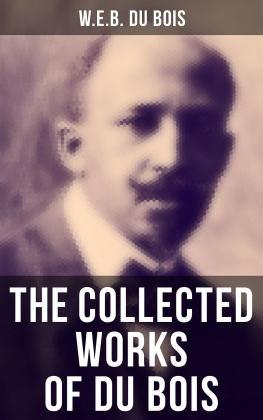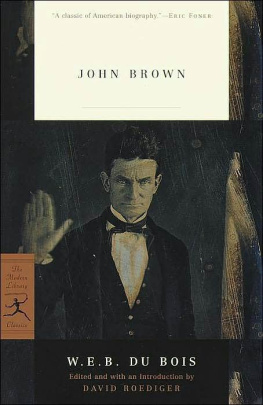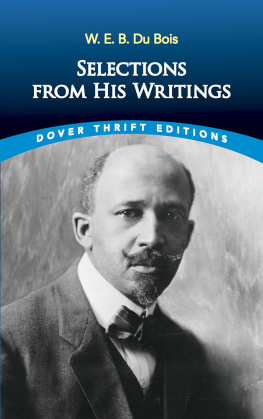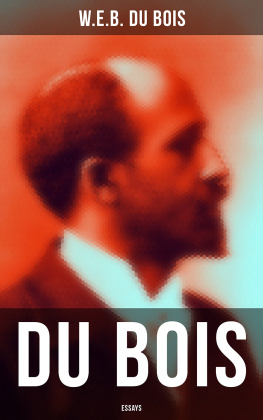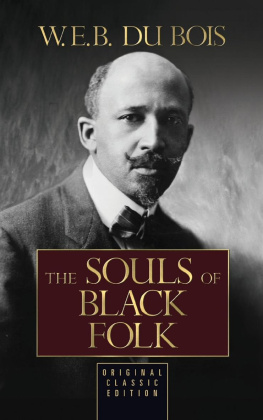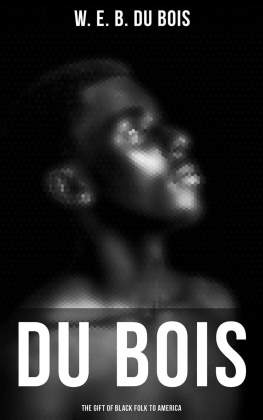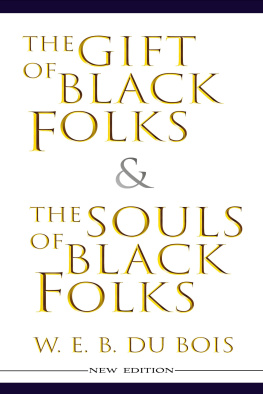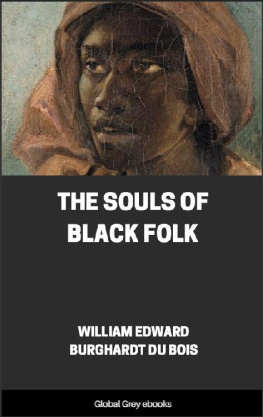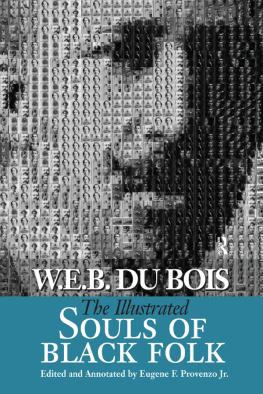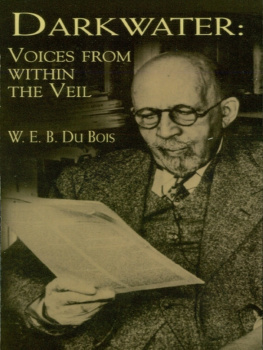Reading suggestions
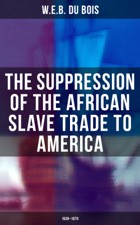 | W.E.B. Du Bois:
The Suppression of the African Slave Trade to America (16381870) |
 | Albion Winegar Tourge:
A FOOL'S ERRAND & Its Sequel, Bricks Without Straw |
 | Karl Marx:
THE COMMUNIST MANIFESTO & CAPITAL |
The Souls of Black Folk
The Forethought
Herein lie buried many things which if read with patience may show the strange meaning of being black here at the dawning of the Twentieth Century. This meaning is not without interest to you, Gentle Reader; for the problem of the Twentieth Century is the problem of the color line. I pray you, then, receive my little book in all charity, studying my words with me, forgiving mistake and foible for sake of the faith and passion that is in me, and seeking the grain of truth hidden there.
I have sought here to sketch, in vague, uncertain outline, the spiritual world in which ten thousand thousand Americans live and strive. First, in two chapters I have tried to show what Emancipation meant to them, and what was its aftermath. In a third chapter I have pointed out the slow rise of personal leadership, and criticized candidly the leader who bears the chief burden of his race to-day. Then, in two other chapters I have sketched in swift outline the two worlds within and without the Veil, and thus have come to the central problem of training men for life. Venturing now into deeper detail, I have in two chapters studied the struggles of the massed millions of the black peasantry, and in another have sought to make clear the present relations of the sons of master and man. Leaving, then, the white world, I have stepped within the Veil, raising it that you may view faintly its deeper recesses,the meaning of its religion, the passion of its human sorrow, and the struggle of its greater souls. All this I have ended with a tale twice told but seldom written, and a chapter of song.
Some of these thoughts of mine have seen the light before in other guise. For kindly consenting to their republication here, in altered and extended form, I must thank the publishers of the Atlantic Monthly, The World's Work, the Dial, The New World, and the Annals of the American Academy of Political and Social Science. Before each chapter, as now printed, stands a bar of the Sorrow Songs,some echo of haunting melody from the only American music which welled up from black souls in the dark past. And, finally, need I add that I who speak here am bone of the bone and flesh of the flesh of them that live within the Veil?
W.E.B Du B.
ATLANTA, GA., FEB. 1, 1903.
II
Of the Dawn of Freedom
Careless seems the great Avenger;
History's lessons but record
One death-grapple in the darkness
'Twixt old systems and the Word;
Truth forever on the scaffold,
Wrong forever on the throne;
Yet that scaffold sways the future,
And behind the dim unknown
Standeth God within the shadow
Keeping watch above His own.
LOWELL.
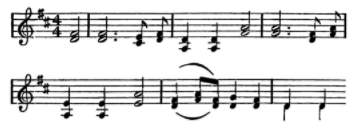
The problem of the twentieth century is the problem of the color-line,the relation of the darker to the lighter races of men in Asia and Africa, in America and the islands of the sea. It was a phase of this problem that caused the Civil War; and however much they who marched South and North in 1861 may have fixed on the technical points, of union and local autonomy as a shibboleth, all nevertheless knew, as we know, that the question of Negro slavery was the real cause of the conflict. Curious it was, too, how this deeper question ever forced itself to the surface despite effort and disclaimer. No sooner had Northern armies touched Southern soil than this old question, newly guised, sprang from the earth,What shall be done with Negroes? Peremptory military commands this way and that, could not answer the query; the Emancipation Proclamation seemed but to broaden and intensify the difficulties; and the War Amendments made the Negro problems of to-day.
It is the aim of this essay to study the period of history from 1861 to 1872 so far as it relates to the American Negro. In effect, this tale of the dawn of Freedom is an account of that government of men called the Freedmen's Bureau,one of the most singular and interesting of the attempts made by a great nation to grapple with vast problems of race and social condition.
The war has naught to do with slaves, cried Congress, the President, and the Nation; and yet no sooner had the armies, East and West, penetrated Virginia and Tennessee than fugitive slaves appeared within their lines. They came at night, when the flickering camp-fires shone like vast unsteady stars along the black horizon: old men and thin, with gray and tufted hair; women with frightened eyes, dragging whimpering hungry children; men and girls, stalwart and gaunt,a horde of starving vagabonds, homeless, helpless, and pitiable, in their dark distress. Two methods of treating these newcomers seemed equally logical to opposite sorts of minds. Ben Butler, in Virginia, quickly declared slave property contraband of war, and put the fugitives to work; while Fremont, in Missouri, declared the slaves free under martial law. Butler's action was approved, but Fremont's was hastily countermanded, and his successor, Halleck, saw things differently. "Hereafter," he commanded, "no slaves should be allowed to come into your lines at all; if any come without your knowledge, when owners call for them deliver them." Such a policy was difficult to enforce; some of the black refugees declared themselves freemen, others showed that their masters had deserted them, and still others were captured with forts and plantations. Evidently, too, slaves were a source of strength to the Confederacy, and were being used as laborers and producers. "They constitute a military resource," wrote Secretary Cameron, late in 1861; "and being such, that they should not be turned over to the enemy is too plain to discuss." So gradually the tone of the army chiefs changed; Congress forbade the rendition of fugitives, and Butler's "contrabands" were welcomed as military laborers. This complicated rather than solved the problem, for now the scattering fugitives became a steady stream, which flowed faster as the armies marched.
Then the long-headed man with care-chiselled face who sat in the White House saw the inevitable, and emancipated the slaves of rebels on New Year's, 1863. A month later Congress called earnestly for the Negro soldiers whom the act of July, 1862, had half grudgingly allowed to enlist. Thus the barriers were levelled and the deed was done. The stream of fugitives swelled to a flood, and anxious army officers kept inquiring: "What must be done with slaves, arriving almost daily? Are we to find food and shelter for women and children?"
It was a Pierce of Boston who pointed out the way, and thus became in a sense the founder of the Freedmen's Bureau. He was a firm friend of Secretary Chase; and when, in 1861, the care of slaves and abandoned lands devolved upon the Treasury officials, Pierce was specially detailed from the ranks to study the conditions. First, he cared for the refugees at Fortress Monroe; and then, after Sherman had captured Hilton Head, Pierce was sent there to found his Port Royal experiment of making free workingmen out of slaves. Before his experiment was barely started, however, the problem of the fugitives had assumed such proportions that it was taken from the hands of the over-burdened Treasury Department and given to the army officials. Already centres of massed freedmen were forming at Fortress Monroe, Washington, New Orleans, Vicksburg and Corinth, Columbus, Ky., and Cairo, Ill., as well as at Port Royal. Army chaplains found here new and fruitful fields; "superintendents of contrabands" multiplied, and some attempt at systematic work was made by enlisting the able-bodied men and giving work to the others.

